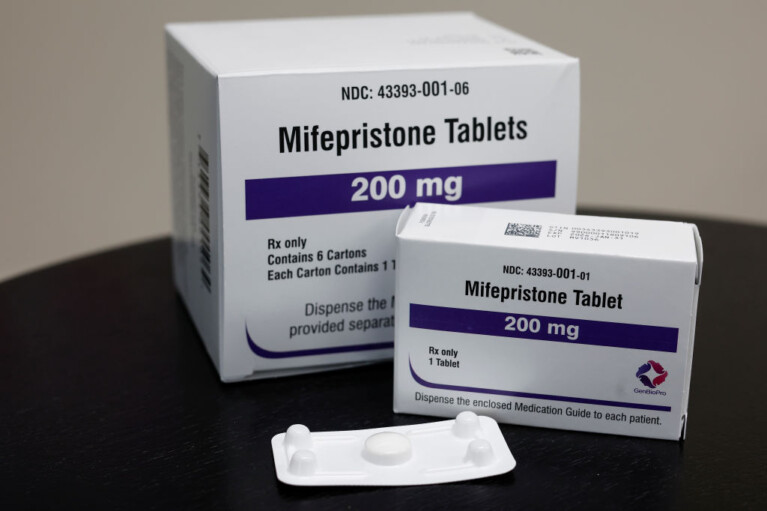Inflation Reduction Act nears 1st anniversary; Van Hollen, state lawmakers highlight health and climate impacts

Approaching the one-year anniversary of the Inflation Reduction Act, Maryland lawmakers and advocates came together Tuesday to highlight provisions of the law aimed at reducing the costs of prescription drugs and providing incentives for renewable energy.
U.S. Sen. Chris Van Hollen (D) spoke at a press conference hosted by the Maryland Health Care for All! coalition, a health policy advocacy group. The press conference, which took place at the offices of the Episcopal Diocese of Maryland in Baltimore, also included the Chesapeake Climate Action Network, which pushes for solutions to climate change.
State Sen. Benjamin Brooks (D-Baltimore County) and Del. Dana Stein (D-Baltimore County) also attended.
Van Hollen and others touted upcoming health care and climate change policies that are results of President Joe Biden’s signing the Inflation Reduction Act into law on Aug. 16, 2022.
In 2025, the Inflation Reduction Act will place caps on out-of-pocket expenditures for Medicare Part D, which covers prescription drugs, to $2,000 a year.
The Inflation Reduction Act also granted Medicare the ability to negotiate prescription drug costs with providers in order to help lower costs. However, this measure is facing a slew of legal challenges by the U.S. Chamber of Commerce, the trade group PhRMA, Merck & Co. and Bristol Myers Squibb, The Hill recently reported.
Larry Zarzecki, a man with Parkinson’s Disease, spoke at the gathering and described how efforts put forth in the IRA could help him handle the costs of his prescription medications down the line.
“I have spent, over the past six or seven years, an entire retirement account with well over $100,000 just on prescription medication,” he said.
“I won’t have to worry as much about ‘Should I heat my little place? Should I get something to eat…or should I skip a prescription?’” he added.
Maryland Matters recently reported that the costs of some of the most common name brand medications used by those enrolled in Medicaid have far outpaced the rate of inflation.
Van Hollen also pointed to efforts to counteract climate change.
“We are right now witnessing the ravages of the climate crisis around the world and here in the country. As we speak, people in Hawaii, Maui, are still having to recover from the devastating fires that took place. That’s one of many examples that shows that there is a huge cost to doing nothing.”
According to the U.S. Department of the Environment, the IRA provided about $8.8 billion in rebates for home energy efficiency and electrification projects, as a part of a $391 billion effort to support clean energy and climate change initiatives.
“I’ll give you one Maryland example,” Van Hollen said. “We’re about to deploy two major offshore wind farms in Maryland. The economics of those projects are made possible because of the tax exemptions in the Inflation Reduction Act. Those projects are going to be 10,000 Maryland jobs. Good paying, union jobs.”
The Inflation Reduction Act also will provide some homeowners with rebates for upgrading their homes to be more energy efficient, he added.
Stein noted that concerns for climate change and health policy often overlap.
“It is so important that we address the climate issue, not just for Mother Earth but for the basic health of our friends,” Stein said. “Our neighbors especially — those who are older, those with respiratory ailments who can’t deal with this high heat or these intense storms that climate change is generating.”
Vincent DeMarco, president of the Maryland Health Care For All! Coalition, said that there is still work to be done in order to improve health care coverage and reduce costs for Marylanders.
“The inflation Reduction Act is great for people on Medicare. Wonderful — but we need to do something for everybody,” he said.
He also referenced the Maryland Prescription Drug Affordability Board, which is tasked with reducing drug prices in the state.
Van Hollen agreed there was more work to be done. As for future efforts to reduce drug prices, Van Hollen said he is reintroducing legislation called the We PAID (Protect American Investment in Drugs) Act, and that he is going to work to get that passed. When that bill was first introduced in 2019, Van Hollen and U.S. Sen. Senator Rick Scott (R-Florida) were co-sponsors.
“Taxpayers also already pay a huge amount of money a year, like $40 billion, a year on medical research,” Van Hollen said. “This is a very good investment for all of us. But we shouldn’t have to pay twice. We shouldn’t have to pay for first research to develop drugs and then have big drug companies price gouge consumers. And so we’re very focused on that piece.”
That said, Van Hollen noted that there are some Republicans looking to undo measures within the Inflation Reduction Act, particularly in the U.S. House of Representatives.
“This is not a partisan statement, this is a statement of fact — our Republican colleagues are trying to undo major parts of the Inflation Reduction Act. As we look forward to the next things we’re going to do, we need to make sure that we prevent those who want to try to turn back the clock,” Van Hollen said.




 Creative Commons Attribution
Creative Commons Attribution